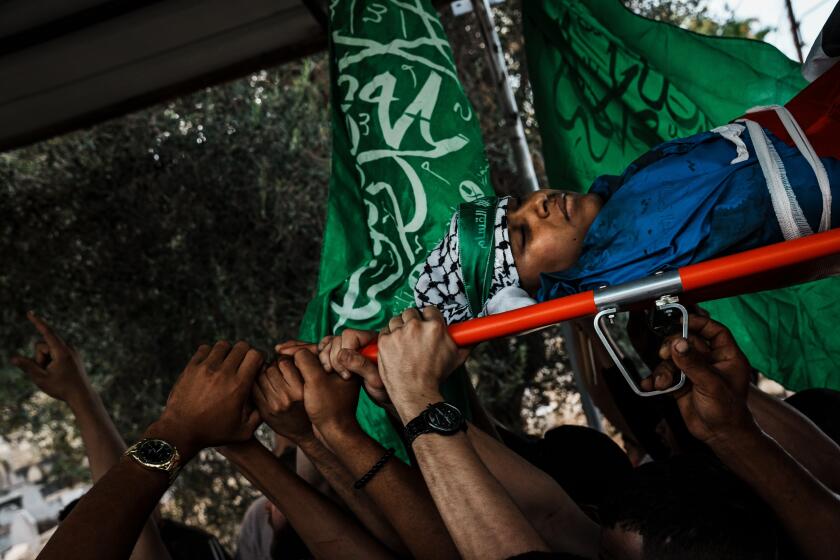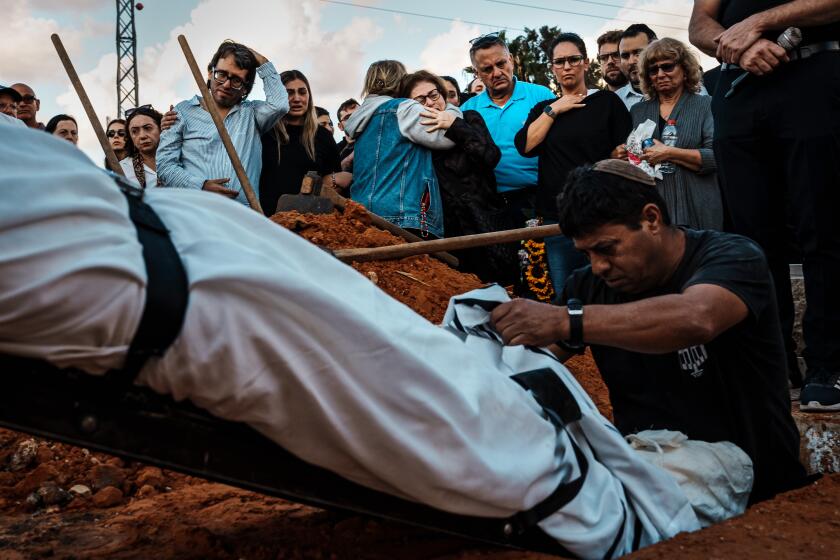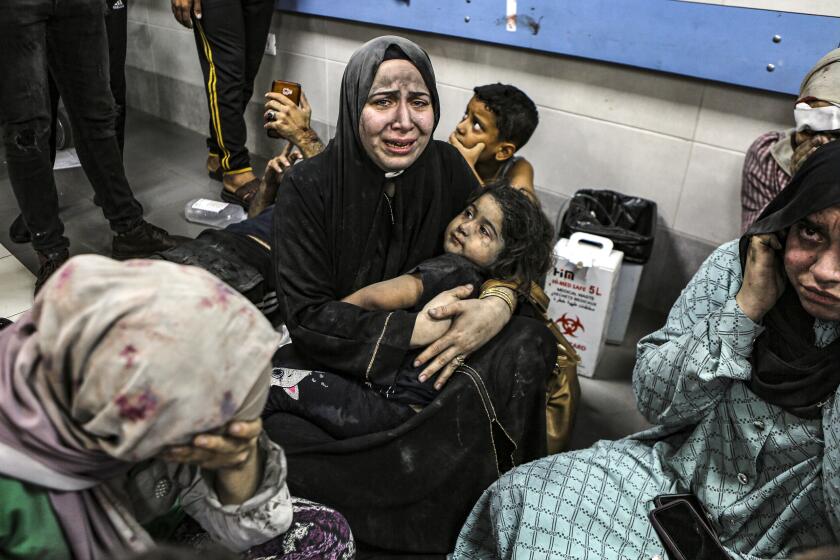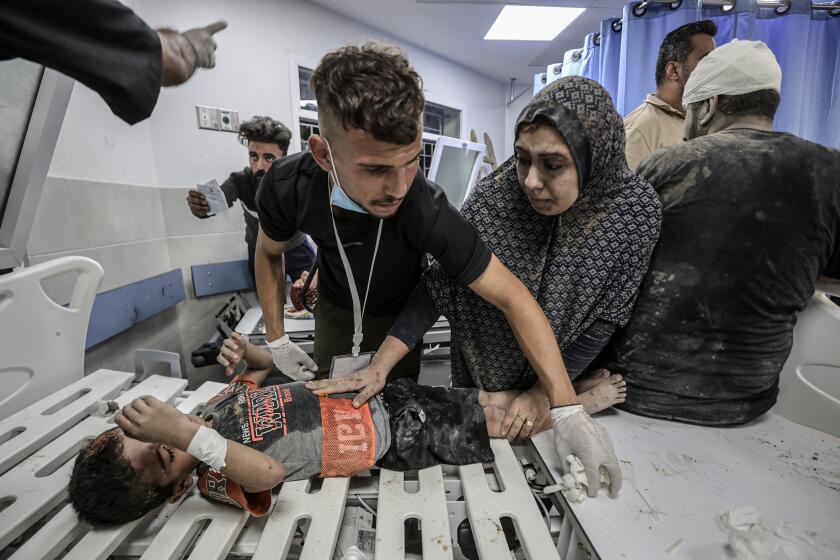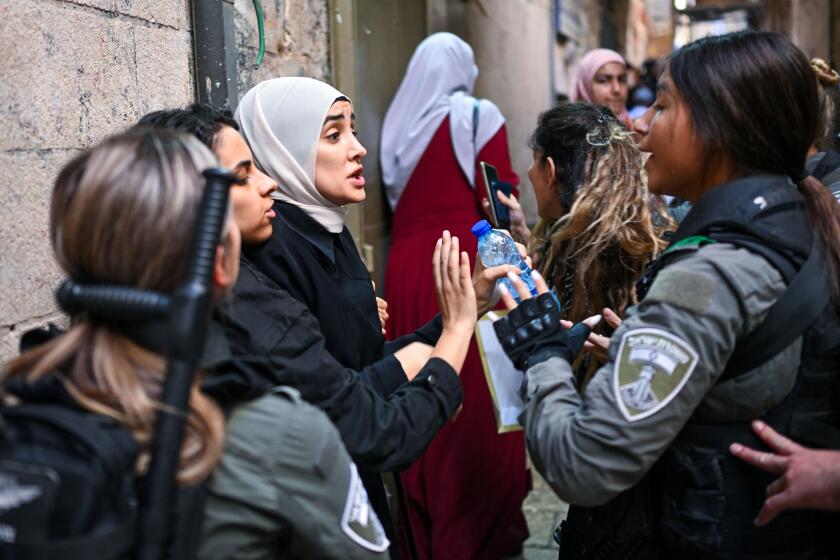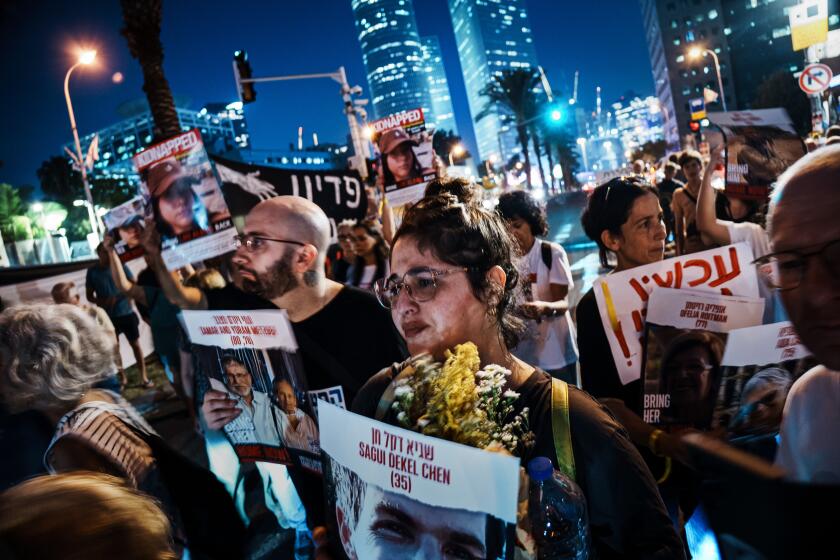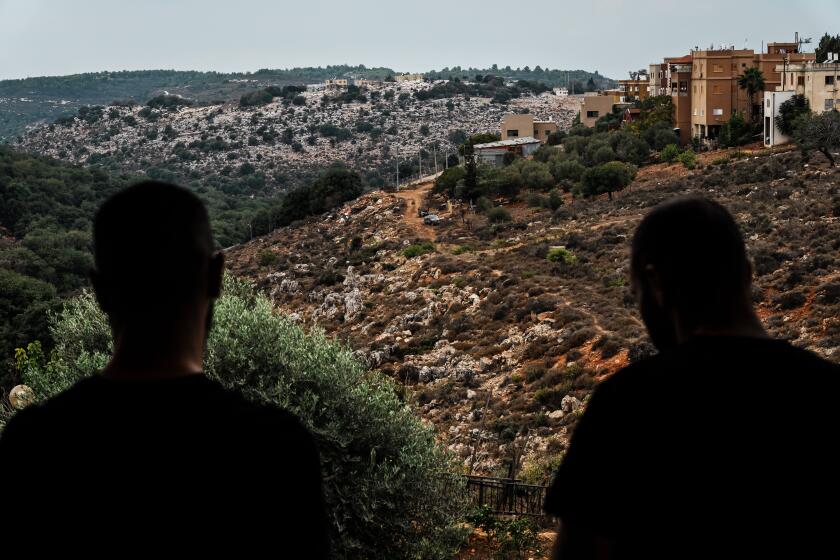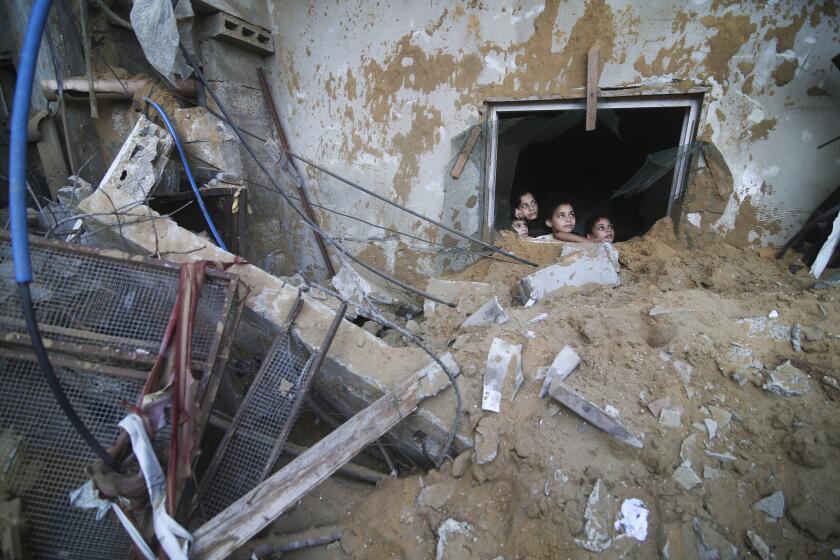Thousands break into aid warehouses in Gaza; Hamas says deaths top 8,000 and Israel widens ground war
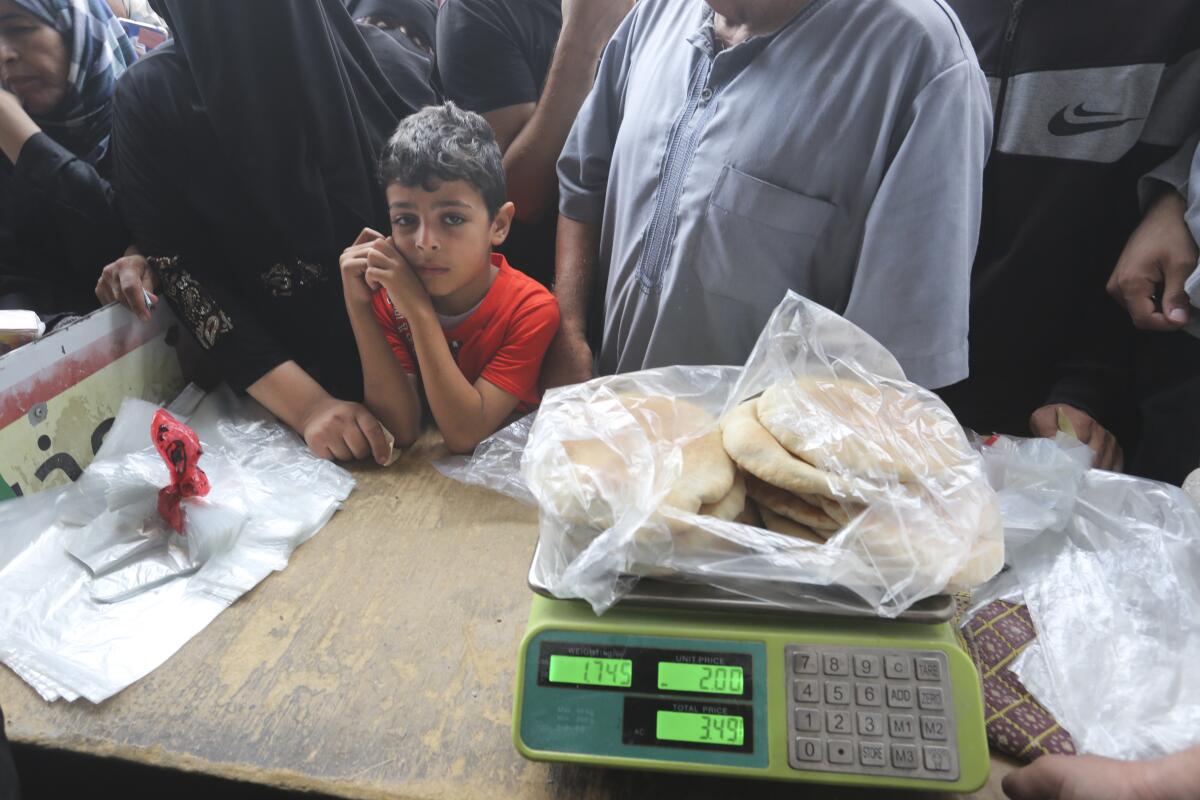
- Share via
DEIR AL BALAH, Gaza Strip — Thousands of people broke into aid warehouses in Gaza to take flour and basic hygiene products, a United Nations agency said Sunday, in a mark of growing desperation three weeks into the war between Israel and Gaza’s militant Hamas rulers.
In response to the crisis, nearly three dozen trucks carrying water, medicine and food entered Gaza from Egypt while tanks and infantry pushed into Gaza as part of what Israeli Prime Minister Benjamin Netanyahu called a “second stage” in the war, which was ignited by Hamas’ brutal Oct. 7 incursion into Israel.
Gaza’s Hamas-run Health Ministry said the death toll among Palestinians has passed 8,000 — most of them civilians. It’s a toll without precedent in decades of Israeli-Palestinian violence, and it is expected to climb even more rapidly as Israel presses its ground offensive. More than 1,400 people died inside Israel, also an unprecedented figure, mainly civilians killed during the initial Hamas massacres.
Communications were restored to most of Gaza’s 2.3 million people Sunday after an Israeli bombardment described by residents as the most intense of the war knocked out phone and internet services late Friday.
On Sunday, 33 trucks of aid came through the only border crossing from Egypt, a spokesperson at the Rafah crossing, Wael Abo Omar, told the Associated Press.
The chief prosecutor of the International Criminal Court visited the Rafah border crossing Saturday and was briefed on the damage caused by Israeli airstrikes to the Palestinian side. Karin Khan said on social media that the court has “active investigations” into recent Israeli actions in Gaza and the West Bank and dating back to the 2014 war. He called the suffering of civilians in this war “profound.”
Khan called on Israel to respect international law but stopped short of accusing it of war crimes. He called Hamas’ Oct. 7 attack a serious violation of international humanitarian law. “The burden rests with those who aim the gun, missile or rocket in question,” he said.
The Israeli military said Sunday it had struck more than 450 militant targets over the last 24 hours, including Hamas command centers and antitank missile launching positions. It said ground forces killed a number of Hamas militants as they exited a tunnel near the Erez crossing, which had been the sole pedestrian passageway into Israel before it was destroyed in the fighting.
Military officials circulated video showing tanks and troops operating in open areas and bulldozers clearing mountains of debris. The Hamas military wing said its militants clashed with Israeli troops who entered the northwest Gaza Strip with small arms and antitank missiles.
The Israeli military said early Monday that its aircraft hit military infrastructure in Syria after rockets from there fell in open Israeli territory.
The warehouse break-ins were “a worrying sign that civil order is starting to break down after three weeks of war and a tight siege on Gaza,” said Thomas White, Gaza director for the U.N. agency for Palestinian refugees, known as UNRWA. “People are scared, frustrated and desperate.”
Violence surges in the West Bank as Israel increases raids to root out militants. Palestinians say the military is using the war as an excuse to crack down.
UNRWA provides basic services to hundreds of thousands of people in Gaza. Its schools across the territory have been transformed into packed shelters housing Palestinians displaced by the conflict. Israel has allowed only a small trickle of aid to enter from Egypt, some of which was stored in one of the warehouses that was broken into, UNRWA said.
Juliette Touma, a spokesperson for the agency, said the crowds broke into four facilities Saturday. She said the warehouses did not contain any fuel, which has been in critically short supply since Israel cut off all shipments after the start of the war, saying Hamas would use it for military purposes.
One warehouse held 80 tons of food, the U.N. World Food Program said in a statement. The agency also said at least 40 of its trucks need to cross into Gaza daily to meet growing needs there.
Israel-Hamas war: In Israel, a quest to identify unrecognizable bodies. In Gaza, bodies are piled and some stored in ice cream trucks as power fails.
Israeli authorities said Sunday that they would soon allow more humanitarian aid to enter Gaza, though details remained unclear.
President Biden in a call with Netanyahu on Sunday “underscored the need to immediately and significantly increase the flow of humanitarian assistance to meet the needs of civilians in Gaza,” the U.S. said.
Israeli authorities said they would soon allow more humanitarian aid to enter Gaza.
Elad Goren, the head of civil affairs of the Israeli defense body responsible for Palestinian civilian affairs, said Israel had established a “humanitarian zone” near the southern city of Khan Yunis and recommended that Palestinians flee there.
Israel and the Palestinian militant group Hamas appear set to go head-to-head on the ground in Gaza. What’s each side’s endgame?
But he provided no details on the exact location of the zone or how much aid would be available. He also said Israel has opened two water lines in southern Gaza within the last week. The AP could not independently verify that either line was functioning.
Meanwhile, people living near Shifa Hospital, Gaza’s largest, said Israeli airstrikes overnight hit near the hospital complex and blocked many roads leading to it. Israel accuses Hamas of having a secret command post beneath the hospital but has not provided much evidence. Hamas denies the allegations.
After a hospital blast in Gaza, doctors struggling to save lives amid danger and dwindling supplies say they and the medical system are near collapse.
Thousands of civilians have been sheltering in Shifa, which is also packed with wounded patients.
“Reaching the hospital has become increasingly difficult,” Mahmoud Sawah, who is sheltering in the hospital, said over the phone. “It seems they want to cut off the area.”
Another Gaza City resident, Abdallah Sayed, said the Israeli bombing over the last two days was “the most violent and intense” since the war started.
The Palestinian Red Crescent rescue service said Israeli airstrikes damaged parts of another crowded Gaza City hospital after it received two calls from Israeli authorities on Sunday ordering it to evacuate. Some windows were blown out, and rooms were covered in debris. The Red Crescent service said airstrikes have hit as close as 50 yards from Al Quds Hospital, where 14,000 people are sheltering.
As the Jewish Sabbath fell and Muslims marked their principal prayer day, Israelis and Palestinians struggled with the terrifying new reality after the militant group Hamas’ deadly attack on Israel.
Israel ordered the hospital to evacuate more than a week ago, but it and other medical facilities have refused, saying evacuation would mean death for patients on ventilators.
“Under no circumstances, hospitals should be bombed. Under no circumstance, a patient should die in a hospital bed. And it is very difficult to evacuate hospitals,” the director general of the International Committee of the Red Cross, Robert Mardini, told CBS’ “Face the Nation.”
Israel says most residents have heeded its orders to flee to the southern part of the besieged territory, but hundreds of thousands remain in the north, in part because Israel has also bombarded targets in so-called safe zones.
An Israeli airstrike hit a two-story house in Khan Yunis on Sunday, killing at least 13 people, including 10 from one family. The bodies were brought to the nearby Nasser Hospital, according to an Associated Press journalist at the scene.
Israel-Hamas war: In a national vigil of sorts, Israelis hope for the return of more than 220 people seized by militants and believed held in Gaza.
The escalation has ratcheted up domestic pressure on Israel’s government to secure the release of some 230 hostages seized when Hamas fighters from Gaza breached Israel’s defenses and stormed into nearby towns and an outdoor music festival, gunning down civilians and soldiers.
Desperate family members met with Netanyahu on Saturday and expressed support for an exchange for Palestinian prisoners held in Israel.
Hamas says it is ready to release all hostages if Israel releases all of the thousands of Palestinians held in its prisons. Israel has dismissed the offer.
Israelis fault Prime Minister Benjamin Netanyahu for security failures that set the stage for war. Few see a path to leadership change amid the crisis.
Netanyahu said Saturday that Israel is determined to bring back all the hostages, and that the expanding ground operation “will help us in this mission.”
“This is the second stage of the war, whose objectives are clear: to destroy the military and governmental capabilities of Hamas and bring the hostages home,” he said in a televised address.
On Israel’s border with Lebanon, residents are worried that groups like Hezbollah will join a war that eventually spirals into a regionwide conflict.
The Israeli military said it was gradually expanding its ground operations in Gaza, while stopping short of calling it an all-out invasion. Casualties on both sides are expected to rise sharply as Israeli forces and Palestinian militants battle in dense residential areas.
When asked about Israel’s military escalation, Biden’s national security advisor, Jake Sullivan, told ABC’s “This Week”: “Ultimately, these are their decisions. This is their action, and they’re best postured to be able to answer questions about how it’s proceeding.” On CBS’ “Face the Nation,” he said the U.S. believes “there should be humanitarian pauses to get hostages out, potentially to get aid in.” And on CNN, he said: “I will let the Israeli Defense Forces characterize their operations and how it fits into their larger plan.”
Despite the Israeli offensive, Palestinian militants have continued firing rockets into Israel, with the constant sirens in southern Israel a reminder of the threat.
Israel says its strikes target Hamas fighters and infrastructure and that the militants operate among civilians, putting them in danger. An estimated 1,800 people remain trapped beneath the rubble, according to Gaza’s Health Ministry, which has said it bases its estimates on distress calls it received.
Hundreds of Palestinian Americans are reportedly stranded in Gaza, frantically searching for ways to flee before Israel’s expected ground assault.
More than 1.4 million people across Gaza have fled their homes, nearly half crowding into U.N. schools and shelters, following repeated warnings by the Israeli military that they would be in danger if they remained in northern Gaza.
Roughly 250,000 Israelis have been evacuated from their homes because of violence along the border with Gaza and the northern border with Lebanon, according to the Israeli military.
Gaza’s sole power plant shut down shortly after the start of the war, and Israel has allowed no fuel to enter.
Hospitals are struggling to keep emergency generators running to operate incubators and other life-saving equipment, and UNRWA is also trying to keep water pumps and bakeries running to meet essential needs.
At Nasser Hospital in Khan Yunis, emergency director Dr. Mohammed Qandeel said about 20,000 civilians were sheltering there. “I brought my kids to sleep here,” said one displaced resident who gave her name only as Umm Ahmad. “I used to be afraid of my kids playing in the sand. Now their hands are dirty with the blood on the floor.”
AP writers Julia Frankel and Amy Teibel contributed to this report.
More to Read
Sign up for Essential California
The most important California stories and recommendations in your inbox every morning.
You may occasionally receive promotional content from the Los Angeles Times.
